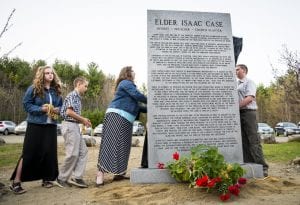 Isaac Case was born in Rehoboth, Massachusetts, February 25, 1761, and after a fruitful ministry graduated to heaven November 3, 1852, at the age of ninety-one. Serious thoughts of God were stirred in the heart of Case from the age of nine until the age of eighteen at which time he recognized his lost condition. Though he sought God, he struggled with doubts until 1779 when his doubts were quenched by the grace of God. He then made a profession of his faith and joined a nearby Baptist church in Dighton. Though he had limited talents, he was a man of distinct character and common sense.
Isaac Case was born in Rehoboth, Massachusetts, February 25, 1761, and after a fruitful ministry graduated to heaven November 3, 1852, at the age of ninety-one. Serious thoughts of God were stirred in the heart of Case from the age of nine until the age of eighteen at which time he recognized his lost condition. Though he sought God, he struggled with doubts until 1779 when his doubts were quenched by the grace of God. He then made a profession of his faith and joined a nearby Baptist church in Dighton. Though he had limited talents, he was a man of distinct character and common sense.
In 1782 Rev. Job Macomber, of Middleboro, Massachusetts, visited the District of Maine. Hearing of a religious interest in Lincoln County, he made his way thither in December and engaged in the work. In January, 1783, he wrote a letter to Rev. Isaac Backus of Middleboro, in which he gave an account of his labors. This letter Mr. Backus read to Isaac Case, who was so impressed with the need of more laborers in that destitute field, that in the autumn of 1783, after having been ordained, he made his way into the District of Maine. He preached awhile in the vicinity of Brunswick and then visited Thomaston, where, May 27, 1784, as a result of his labors, he became pastor of the newly organized church. Rev. Case served as pastor of the church for many years with the understanding that he be allowed to carry on his missionary work when he felt the call. He traveled all over the state of Maine and even into New Brunswick and Nova Scotia to help spread the Gospel and establish Baptist churches.
At the same time, Isaac Case began the church in Thomaston. A church was organized in Bowdoinham, and Rev. Job Macomber was soon after called to the pastorate. On January 19, 1785, a church was organized in Harpswell, and Mr. James Potter, who had labored in that place with Rev. Isaac Case, was ordained as its pastor.
On May 24, 1787, these three pastors, with delegates from their churches, organized the Bowdoinham Association in the house of Mr. Macomber at Bowdoinham. Mr. Case was made moderator of the association, and Mr. Potter preached the first sermon. In 1789, three more churches and one ordained minister had been added to the association. By 1790, the number of Baptist churches in the District of Maine was 11, with about 500 members. In 1797, 10 years after its organization, Bowdoinham Association comprised 26 churches, 17 ordained ministers and 1,088 members.
Reverend John W. Hyssong described Baptist Church history in 1941: “It was in the year 1783 that three elders by the name of Case, Potter, and Lord began preaching and bringing before the people of Brunswick the views of the Baptist denomination. The services were held in private homes and many
people accepted their persuasions. A hard stormy battle lay ahead for those who would break from “the old standing order” and become Baptists. It was the day of the Standing Order, which, originally supported from the town treasury, was still practically a State Church. The Baptists were persecuted by taxes, fines, law suits, whippings, and imprisonments. But in spite of these, they gained their freedom until 1790, when Samuel Woodward and others formed themselves into a Baptist Society and refused to be taxed by the First Parish. There was entered into the town record “the protest against ever paying anything to any Congregational or Presbyterian preacher.”
Isaac Case had the heart of an evangelist; and when converts were made, he quickly formed them into churches that became vibrant lighthouses to their communities. Rev. Case found himself among the new towns and plantations along the western banks of the Kennebec River, where, says Rev. Case, “I found the field already white.”
Isaac Case was one of the greatest church planters America has ever seen. By his own testimony, he had personally won and baptized over one thousand converts during his ministry. In addition, he started or helped to start over 350 churches. He lived in a different era, but the need today is just as great. Some of this material was taken from books that are out of print. -Taken from CentralBaptistChurch.net
A memorial similar to the one on Eggemoggin Baptist Church property has been erected at North Manchester Meeting House.

